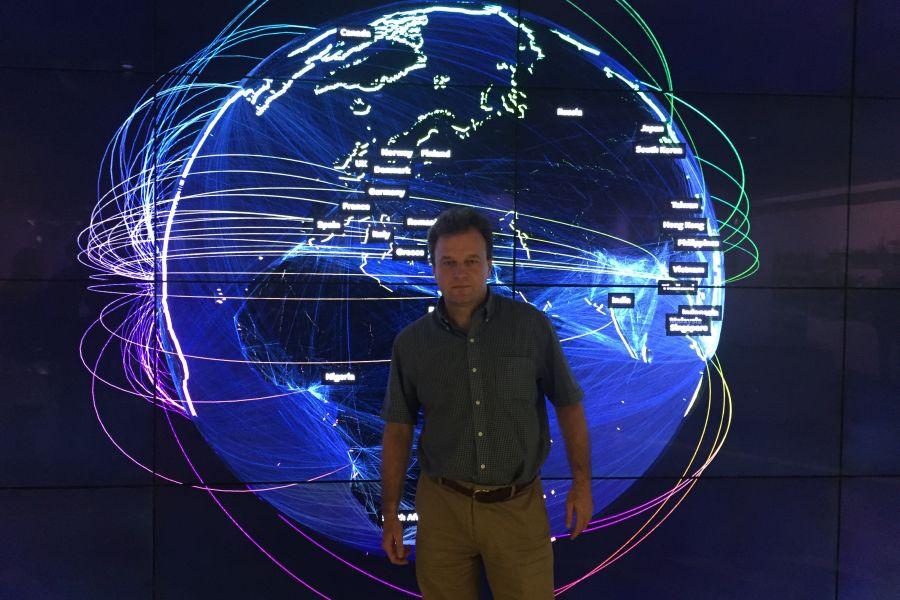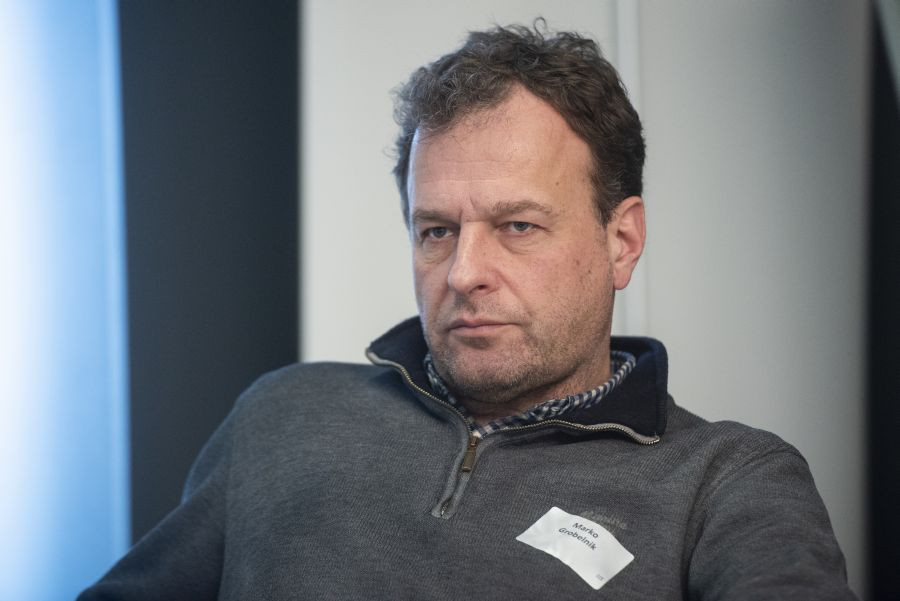The COVID-19 pandemic has created a new reality
Marko Grobelnik is a researcher at the Artificial Intelligence Laboratory of the Jožef Štefan Institute in Ljubljana and the digital ambassador of Slovenia. In recent years he has cooperated intensively with international organisations, such as the OECD, the Council of Europe, the GPAI and the European Commission, with regard to the future regulation of artificial intelligence. Along with his team at the Jožef Štefan Institute he participated in the launching of the "OECD AI Policy Observatory", the purpose of which is to constantly monitor and understand the development of artificial intelligence at the global level. In 2020, he participated in setting up the International Research Centre for Artificial Intelligence (IRCA.org) under the auspices of UNESCO, which is located in Ljubljana.
How is digitalisation related to the new reality, and what issues does it solve?
In essence, digitalisation is a mechanism which optimises certain life processes and makes them more efficient. In the past, this role was played by machines; today it is played by computers. During the COVID-19 epidemic, digitalisation was important – mainly from the perspective of providing information. Of particular importance was rapid data transfer, and without it there would have been many more victims.
Digitalisation and COVID-19 have also changed people’s lifestyles. Many physical contacts have been transferred to the digital world. School, meetings, business operations and so on. Enterprises also needed to undergo a significant digital transformation. Exceptions to this were factories, where this process is much more complicated. At the same time, digitalisation has helped in developing a vaccine and understanding the disease.
A very useful application introduced by the Slovenian Government is without doubt the mobile app #OstaniZdrav (#StayHealthy). It helps the few Slovenian epidemiologists, all working at maximum capacity, and above all it protects us. It is an example of good practice and has already been introduced by some other European countries. We all hope that there will be no explosive epidemic outbreak of COVID-19, but such an application can really save lives in critical moments, while also does not interfering with our privacy.
COVID-19 is not only a health issue. Does it also bring global economic challenges?
Absolutely. Society is a dynamic process and there is a link between cause and effect in everything. But sometimes it is not quite clear in which ways things are connected. Business processes have an impact on changes with regard to work, the economy and so on. Part of this is physical distancing, or so-called social distancing, which also has its consequences. In a situation such as the COVID-19 crisis, people also change their consumer habits. Global changes have strongly affected the Slovenian economy, and with this some people have lost their jobs.
At the beginning of the year, I visited New York. At that time, it was a city buzzing with energy, there was an abundance of everything and traffic jams everywhere. If, back then, someone had asked me in what situation this could all disappear, my first thought would have been war. But of course it was not war that brought quiet to the city, as a very short time later this situation was caused by COVID-19. The fact, however, is that the COVID-19 crisis is going to last. We must be aware of it and adapt our lives accordingly.
The present Slovenian Government places great emphasis on cooperation with neighbouring countries in all areas, which is an important part of good neighbourly relations. Can Slovenia also become one of the most important regional partners in the field of digitalisation and artificial intelligence?
On the international stage, Slovenia is definitely an important partner in many areas. In our country, there are approximately 200 researchers and up to 20 enterprises active in the field of artificial intelligence. In comparison with others, Slovenia’s capacities are limited due to its small size. However, we must be aware that in scientific work the capacities are not necessarily the most important element. It is the quality of ideas, innovation and so on that count more than the number of people involved. And from this aspect Slovenians are indeed competitive, which is something to be proud of.
Is trust one of the most important values in the current situation?
One of the projects the Institute is engaged in is analysing news. These days, one particular problem we face is the so-called "infodemic", which is not necessarily fake news, but news that is only half true or misleading. I would like to mention this because a large part of the public, not only in Slovenia but also worldwide, claims that this virus does not exist. This is usually the opinion of some non-experts or semi-experts who have a strong influence on the formation of public opinion. As someone who is an expert in numbers, I am convinced that it can be statistically proven that the virus exists, and that we must not underestimate it.
Certain fears are of course also the result of people’s mental state and the circumstances in which they now live. Lockdowns definitely have far more serious consequences for those living in smaller flats and with unstable family relationships.
What about the question of democracy in this new reality?
I am not a lawyer. But I understand how complex systems function. And society is a complex system. We should be aware that even in a democracy, there is no voting on certain things. For example, on human rights and taxes. Currently, we are faced with a situation, the COVID-19 epidemic, which requires a fast response. In a situation like this, it is important to trust the government we have elected. We should bear in mind that in these circumstances the government must react promptly and with determination to curb the problem, which, in a certain sense, might also seem authoritarian.
In times of war, when we are attacked, the only logical response is to defend ourselves. Today there is an invisible enemy among us, one which arrived unexpectedly, and we are therefore confused. We must be aware that currently we have to face a phenomenon that can cause or is causing great damage. It is therefore our task to behave responsibly and to respect the measures important for our safety and that of others.
Could digitalisation make the world a better place?
Digitalisation definitely contributes to the optimisation of those aspects of life where we introduce it. Looked at it this way, it is very positive. But at the same time it can change our way of work and our way of life, which might also have negative consequences for certain people. For this reason, this new reality cannot be completely idealised.
Some years ago I gave a lecture at the Chamber of Agriculture on robots capable of picking fruit. With these robots farmers would, of course, reduce their costs, avoid problematic relationships and so on. But on the other hand, several people would be left without financial resources.
In the future certain jobs will definitely become redundant. In this context, sooner or later a new social contract will be needed, because otherwise problems will occur in terms of the distribution of wealth in society.
Digitalisation therefore opens up completely new aspects and horizons, and thus may be able to solve problems that we have previously been unable to solve. And artificial intelligence, particularly, is a field that is extremely interesting and sometimes, at first sight, reminds us of science fiction, although it is really only a collection of mathematical and computer tools.
Author: Tanja Glogovčan Belančić
Similar articles
-
Alpina’s I feel Slovenia hiking boot
-
Elan showcased the first fully functional folding all-mountain carving skis in the world
-
The COVID-19 pandemic has created a new reality
-
Dr Miha Mlakar: a scientist connecting artificial intelligence with sport
-
International Research Centre on Artificial Intelligence in Ljubljana
-
The innovative spirit of Slovenian youth - My company project
-
Slovenia – the only country with a zero waste capital city, zero waste hotel and zero waste events



